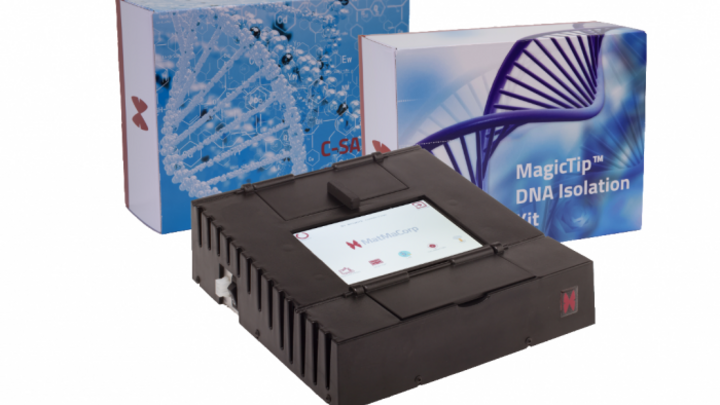MatMaCorp brings genetic testing technology into veterinary clinics

Scientific instrument manufacturer, MatMaCorp has developed a system that enables veterinary clinics to conduct inhouse genetic testing for their clients rather than outsourcing to larger high-tech labs.
The company’s platform is designed to analyze the genetic information carried in nucleic acid molecules such as deoxyribonucleic acid (DNA) in animals or ribonucleic acid (RNA) in some pathogens. This analysis allows the user to identify the genetic character of any living organism, from viruses to human beings. The MatMaCorp system has taken a complex process and simplified it so that non-laboratory personnel and those without technical training can conduct genetic testing inhouse or onsite (such as in a veterinary clinic or on a farm) that is typically done only at high-tech facilities.
Dr. Abraham Oommen, MatMaCorp Founder and CEO, said, “We have taken the mystery out of molecular diagnostics and made it easy and seamless for somebody without any training to use.”
MatMaCorp has developed a low-throughput device that can process eight tissue samples at a time for small scale operations at veterinary clinics or farms. MatMaCorp can customize the platform for the client according to the genetic tests required. Beta testing machines are now in place at several locations around the world where users are able to conduct onsite analyses of genes that not only indicate certain characteristics of an animal, but also aid in the detection of genetic traits that may lead to disease in the animals.
The device has diverse applications such as testing for food quality and animal health. The device is already being used to test for the presence of the A2 form of beta-casein, a milk protein produced by dairy cattle that is considered to be better tolerated by people with digestive issues; the device is also used to test for genes in beef cattle that indicate the animals’ susceptibility to congestive heart failure.
Dr. Oommen is particularly proud of recent tests that the company has customized for the USDA. A farmer in Kansas had previously contacted the USDA requesting a test for Booroola, a fecundity marker in sheep that indicates which ewes will always produce more than two lambs when bred. Samples are typically sent to New Zealand to get tested, resulting in a long wait time. It took the team at MatMaCorp, however, only five days to develop the biochemical tests and provide it to the scientist who asked for it. The results incidentally matched the output from validating tests run at the facility in New Zealand by 100%. This serves as an example of what Dr. Oommen and his team can do with this technology.
MatMaCorp is now beta-testing in the field for Porcine Reproductive and Respiratory Syndrome (PRRS), a viral disease that can quickly wipe out an entire herd of pigs. Normally, farmers must send out blood samples to be tested, and then wait 48 hours for results. However, animals remain at risk for infection during the waiting period. MatMaCorp’s device produces a result in as few as two hours, and testing can be done at the farm itself, which is a huge paradigm shift for the industry, according to Dr. Oommen.
The MatMaCorp system may also be of utility in environmental and conservation efforts. Though the company is not yet involved in developing applications for humans, the potential also exists for this technology to be used in biomedical research and clinical diagnostics. The system has already been implemented to detect infectious disease-causing strains of bacteria that could impact not only veterinary medicine but also human health.
This is the second biotech company established by Oommen in Nebraska, who qualified in molecular genetics at the University of Kansas. He previously co-founded GeneSeek in 1998, after having worked for 5-years developing automated DNA sequencing instruments for Lincoln-based scientific device company, LI-COR Biosciences. GeneSeek was later acquired by the global food and animal safety corporation, Neogen, in 2010.
Since then Dr. Oommen has “wanted to build something that people could take into the field, or can use simply in the lab.” He founded MatMaCorp (Materials and Machine Corporation) in 2014 in a 1000-square feet space above The Mill in downtown Lincoln. The company employs a team of roughly 30 engineers, scientists, and administrative staff. Plans are underway for a new site that will increase capacity to 20,000 square feet to be used primarily for additional manufacturing and research space.
Funded in part through Invest Nebraska, the majority of MatMaCorp’s $9 million in external support has been provided by local private investor, Jim Pillen of Nebraska-based Pillen Family Farms.
“He believed early on in what we are building,” acknowledged a grateful Dr. Oommen, “We are a little company in Nebraska – people have been trying to do this for thirty years. We are proud to say we are doing it very well.”
Visit www.matmacorp.com to learn more about this company.
